

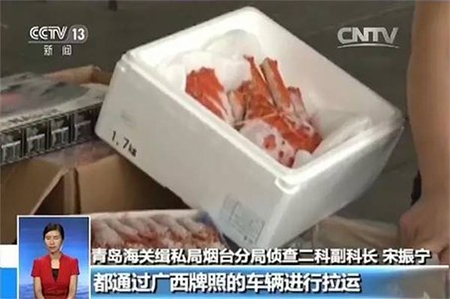
On Aug. 21, Qingdao Customs announced that a group of smugglers responsible for bringing over 5,000 tons of seafood into China over the past two years had been apprehended. The total value involved in this case is 230 million yuan.
In a survey administered early this year, customs inspectors found that some upscale seafood was being sold for cheaper prices than declared, which stood out as unusual. Customs officer Song Zhening explained that a large quantity of scallops, king crabs and fish was imported by vans licensed in Southwest China's Guangxi.
"The seafood originated in Japan, Russia and the U.S., so why did it come in vans from Guangxi?" Song mused. "It was strange."
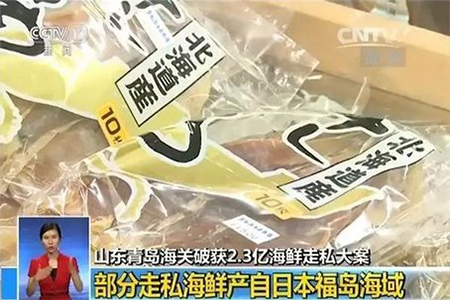
As the investigation got underway, a seafood import and export company in Shandong became a primary suspect. Manipulated behind the scenes by a man surnamed Wang, the corporation had branch companies in Shandong, Fujian, Liaoning and Guangxi provinces. There was also a branch in the U.S.
Inspector Li Fudong figured that, in order to avoid sanctions, Wang stayed in the U.S. year round. All of the business's contacts were handled by the U.S. branch. After receiving payments, domestic companies transferred the money abroad via underground money exchangers.
On June 24, Wang was captured by police in Penglai Airport. Meanwhile, customs officials stopped the other suspects in Shandong, Fujian, Guangxi and Liaoning.
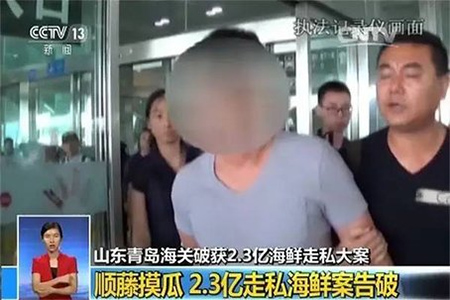
Additionally, inspectors found that the seafood came into China via a detour in Vietnam, as the smugglers were trying to avoid duty and quarantines. Some of the seafood also came from Fukushima, Japan.
After the 2011 earthquake, Fukushima was polluted by nuclear radiation. Almost all countries therefore forbade the importation of seafood from Fukushima. Even local residents don't eat it. Thus, the price of upscale seafood from Fukushima dropped precipitously.
Li explained that the smugglers gathered the commodities in Hokkaido. They then transported the seafood to Fangchenggang city of Guangxi and Shandong province.

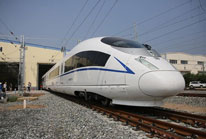 World's fastest bullet train to start operating next month
World's fastest bullet train to start operating next month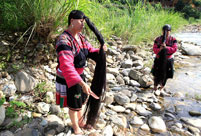 Huangluo: China's 'long hair village'
Huangluo: China's 'long hair village' Spectacular bridge with one of the tallest piers in the world
Spectacular bridge with one of the tallest piers in the world Magnificent view of Hukou Waterfall
Magnificent view of Hukou Waterfall A glimpse of Stride 2016 Zhurihe B military drill
A glimpse of Stride 2016 Zhurihe B military drill US Navy chief tours Liaoning aircraft carrier
US Navy chief tours Liaoning aircraft carrier Chinese American woman wins Miss Michigan
Chinese American woman wins Miss Michigan Centenarian couple takes first wedding photos
Centenarian couple takes first wedding photos Traditional Tibetan costumes presented during fashion show
Traditional Tibetan costumes presented during fashion show Top 10 livable Chinese cities
Top 10 livable Chinese cities Top 20 hottest women in the world in 2014
Top 20 hottest women in the world in 2014 Top 10 hardest languages to learn
Top 10 hardest languages to learn China’s Top 10 Unique Bridges, Highways and Roads
China’s Top 10 Unique Bridges, Highways and Roads Chinese athletes switch nationality for opportunities, welfare
Chinese athletes switch nationality for opportunities, welfare With another Olympic gold, Lang Ping rekindles national pride
With another Olympic gold, Lang Ping rekindles national pride Who holds the purse strings?
Who holds the purse strings? Chinese author Hao Jingfang wins Hugo Award for Best Novelette with ‘Folding Beijing’
Chinese author Hao Jingfang wins Hugo Award for Best Novelette with ‘Folding Beijing’Day|Week